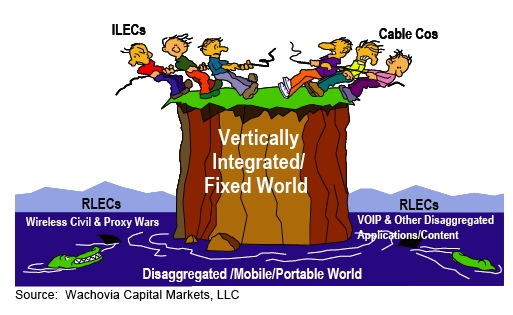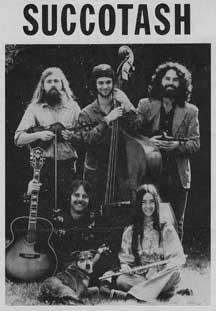Monday, October 31, 2005
FCC publishes Net "Freedoms"
Washington, D.C. – The Federal Communications Commission today adopted a policy statement that outlines four principles to encourage broadband deployment and preserve and promote the open and interconnected nature of public Internet: (1) consumers are entitled to access the lawful Internet content of their choice; (2) consumers are entitled to run applications and services of their choice, subject to the needs of law enforcement; (3) consumers are entitled to connect their choice of legal devices that do not harm the network; and (4) consumers are entitled to competition among network providers, application and service providers, and content providers. Although the Commission did not adopt rules in this regard, it will incorporate these principles into its ongoing policymaking activities. All of these principles are subject to reasonable network management.The needs of law enforcement, legal devices, no harm to the network, consumers, reasonable network management . . . we network users, we get the picture.
Link.pdf
Technorati Tags: F2C, KevinMartin
Sunday, October 30, 2005
"Coddled Corporate Giants" retarding US Broadband
Coddled corporate giants make broadband in the U.S. slower and more expensive than elsewhere. But Community Internet projects -- and a competitive market -- offer a solution.It disappeared! It was replaced with a much more boring lead-in . . . something about France.
*** UPDATE: Read the whole article free here. Thanks, Esme! ***
The article is in Salon Premium, so, in the event that you don't subscribe, here are the first few paragraphs:
Next time you sit down to pay your cable-modem
or DSL bill, consider this: Most Japanese consumers can get an
Internet connection that's 16 times faster than the typical
American DSL line for a mere $22 per month.
Across the globe, it's the same story. In France, DSL service
that is 10 times faster than the typical United States
connection; 100 TV channels and unlimited telephone service cost
only $38 per month. In South Korea, super-fast connections are
common for less than $30 per month. Places as diverse as
Finland, Canada and Hong Kong all have much faster Internet
connections at a lower cost than what is available here. In
fact, since 2001, the U.S. has slipped from fourth to 16th in
the world in broadband use per capita. While other countries are
taking advantage of the technological, business and education
opportunities of the broadband era, America remains lost in
transition.
How did this happen? Why has the U.S. fallen so far behind the
rest of its economic peers? The answer is simple. These nations
all have something the U.S. lacks: a national broadband policy,
one that actively encourages competition among providers,
leading to lower consumer prices and better service.
Instead, the U.S. has a handful of unelected and unaccountable
corporate giants that control our vital telecommunications
infrastructure. This has led not only to a digital divide
between the U.S. and the rest of the advanced world but to one
inside the U.S. itself. Currently, broadband services in America
remain unavailable for many living in rural and poorer urban
areas, and remain slow and expensive for those who do have
access.
Technorati Tags: Broadband, Broadband-per-capita, USLosingLead
What was the Cogent-Level3 dispute about?
Further, they do seem to have settled amicably by adjusting the terms of their peering agreement.
Does anybody have any better take on the substance of the Level3-Cogent dispute? What was it all about?
Technorati Tags: Cogent, Level3, peering
Saturday, October 29, 2005
Another pic of the Succotash concert


Here's Joe Weed and Marty Kendall in the first set of last week's Succotash Reunion concert.
There are more great pics of the concert at photographer Steve Southard's website.
Technorati Tags: JoeWeed, Music
Friday, October 28, 2005
Level3 and Cogent End Peering Dispute!
Last October 7, when Level3 abruptly ended its peering arrangement with Cogent in a business dispute, leaving customers in the lurch, I was puzzled. I've spent enough time with Crowe and Schaeffer to respect both of them deeply. Why would they let a silly business dispute blow up into an event that might potentially weaken the whole Internet?
Last week, Daniel Berninger kindly invited me to help draft a letter expressing our concern for the effect of such acts on the health of the Internet. Our aim was to get a bunch of important Internet architects, builders, users and policy people to sign it. We were going to release it on Monday, November 7; Jim Crowe had threatened to escalate on November 9th. We didn't want to twist anybody's arm or dictate business terms, but we did want to focus some sunshine (and maybe a little heat) on the process, give voice to customer frustration, and advocate for 'net goodness.
Fortunately, we didn't need to revise our letter beyond Draft 0.3.1!
But I did want to share the last version of the letter we were working on:
Mr. Crowe:In the process, I sure learned a lot about peering, for example, from Susan Crawford's blog post on Why De-Peering Matters. And Dan and I (mostly Dan) put together a nice FAQ which said, in part,
Mr Schaeffer:
De-peering threatens the universal connectivity of the Internet. We ask that Level 3 and Cogent resolve their dispute without de-peering their networks.
Universal Internet connectivity is in your larger interest and ours. Peering is necessary for universal connectivity, which is an essential component of the more-faster-cheaper-better virtuous circle that powers info tech industry growth, expands the Internet's usefulness to everybody, and puts more traffic on the Internet to grow carrier revenues.
Light-handed Internet regulation and governance is in your interests and ours. But as de-peering disrupts both Level 3 and Cogent end users, people are beginning to demand heavier regulation via US, EU, and/or UN based intervention. Renewed de-peering, such as that announced by Level3 for November 9, will make such demands louder. In addition, de-peering might set a dangerous precedent for the behavior of even larger carriers.
Therefore, we ask that Level3 and Cogent consider other ways to resolve the current dispute in ways that do not threaten the well-being of the Internet as a whole.
Yours truly,
The consolidation of backbone providers with the acquisition of AT&T and MCI by SBC and Verizon threatens more scarcity and rising prices . . . the loss of settlement free peering among Tier 1 providers threatens to reduce inter network performance and raise costs that get passed on to end users. The Internet ecosystem will suffer to the extent a toll collecting ethic replaces the value creation mode of competition.and
The decisions of Level 3 and Cogent will affect more than just their direct customers. The resolution of this peering dispute has important implications for everyone presently benefiting from the role of settlement free peering.But Jim Crowe, himself, actually said it best. Here are his own words from year 2000 in contemplation of a Worldcom-Sprint merger:
"The free, open and competitively neutral interconnection of competing networks is the real key to competition. In the emerging Internet industry, interconnection is called 'peering'. Whatever you call it, it is the single most important gatekeeper to competition. It lets information flow unimpeded from one company's network to another's, allowing users of one network to communicate with users of another network.
"We have consistently told the Justice Department, the European Commission, the FCC and others, that competition in communications . . . depends on open, cost effective and non-discriminatory connection of the networks of competing companies.
snip
"We at Level 3 believe that open and fair interconnection is just as important to the development of a competitive Internet backbone industry as it was to the development of the competitive telephone services market."I'm glad Jim and Dave exercised wisdom and perspective in this matter. We have more important Internet threats to worry about!
Technorati Tags: Cogent, DontBeEvil, Internet, Level3, peering
Thursday, October 27, 2005
The Wisdom (and Stupidity) of Crowds
Technorati Tags: statistics, stories
Tuesday, October 25, 2005
F2C: Right to Broadband
Think the video iPod will revolutionize the world? Think again. If you don't have a good broadband connection to download content, you're just looking at an overpriced paperweight. Google Earth may be fascinating, but you still need access to the Internet to view its pretty pictures. You get the point. But it's more than just the Internet. The big change on the horizon is the move to enshrine access to a broadband connection as a basic right of citizenship . . . Ultimately, the question boils down to whether you believe that broadband is so important that it should get treated like a public utility, in the much the same way as water or power.And he mentions an interesting experiment I never heard of before:
Can the localities take the lead? In [the U.S.] there's nothing to rival the Associazione Nazionale Piccoli Comuni d'Italia, an Italian association of small towns that has adopted a plan to promote the adoption of Wi-Fi and wireless technology. That's helped even isolated burgs--like the village of Chamois, deep in the Italian Alps--offer wireless access to its residents.Anybody know anything about the Associazione Nazionale Piccoli Comuni d'Italia? I'd like to learn more!
Thanks to Jim Baller for the initial link!
Technorati Tags: Broadband, F2C
Monday, October 24, 2005
Pictures of Succotash Concert

L to R, that's Joe Weed, Beverly Smith, Vince Flores, Steve Kritzer and Bruce Bowers.
When you go to Steve's website to see the rest of the pictures, check out how many different instruments each band member holds from pic to pic.
Judith Miller (NY Times) is the worst blogger stereotype
Judith Miller did all the things that bloggers are stereotyped as doing. She had an agenda. She hid her real motives. She was not under editorial control. She got things wrong. She painted an incomplete picture . . .The above is a paraphrase, but it is correct in spirit.
Technorati Tags: JeffJarvis
Saturday, October 22, 2005
The Succotash Reunion Concert
In the first half of the evening, the individual band members each played two or three numbers on their own or in small ensembles. I've been meaning to write about how, with good performers, you get to know about their lives and their spheres, but I don't know how to do it without descending into cliche. It happened last night.
For me, every performer's mini-set was delightful and revealing. The standouts, for me, were the harmonies of Beverly Smith and Carl Jones, the amazing fiddlework of Joe Weed and Bruce Bowers, the inspiring personality of Bruce Bowers, the jazzy and expressive singing of Marty Kendall (Joe Weed's wife) backed by Joe and guitarist Steve Palazzo, Bruce Bowers' daughter Jasmine's Latino piano playing (who we'll hear more from, I am *sure*), and the Silk Road work of bassist Vince Flores.
Then, in the second half, they played ensemble, as Succotash. Despite -- and perhaps because of -- their 30-year hiatus, they were just, just, just, . . . great. Jaw-droppingly good. Surprising. Multi-talented. A team. A whole greater than the sum of their amazing parts. And they had fun. And they swang and sang and played and smiled. Highlight: just about every song. Maybe the "Never on Sunday" theme. Maybe "The Handsome Cabin Boy." Maybe the song about the circle closing again. It was deeply emotional -- joyful, mostly.
The music of the evening ranged from singer-songwriter-folk to European Cafe to roots jazz to swing to Bach to Celtic. Many of the songs were brand new to me.
The audience was special too. I kept looking at the "Occupancy 60 Persons" sign and seeing "55 MPH". I met a woman who had waitressed at the venue where Succotash used to hold down Friday and Saturday nights every week for two years. She couldn't stop smiling all night. I met a hero of mine, harmonica genius Norton Buffalo. I didn't know most of the folks, but many of them knew each other, and for many it was their own personal reunion. I had merely flown in from Connecticut to see the event . . .
It was special, special night. If they do it again in 30 years, I'll be there. But it was obvious to me that they should not wait near that long.
Technorati Tags: JoeWeed, Music
Friday, October 21, 2005
Where there's a will . . .
Technorati Tags: JoeWeed, Music
Wednesday, October 19, 2005
Double agent in double sendup
WSIS Blog Aggregator
Technorati Tags: Berkman, EthanZuckerman, RebeccaMacKinnon, WSIS
Tuesday, October 11, 2005
Freedom to Connect is Political
Why do you, personally, care about [Freedom of the Network]? Telecom isn’t the only industry with distribution bottlenecks, significant market power, and cross-subsidy between the stages of production. Just look at how baked beans are positioned in supermarket shelves. Manufacturers in the UK pay the supermarkets to buy prime positions. Yet telecom incites such great passion in intelligent people. Baked beans don’t. What’s going on?After a couple of weeks attempting to give economic underpinnings to the phrase, I think he's got a point.
I think I’ve finally worked out why. It’s David Isenberg’s elephant in the corner — what he ambiguously calls Freedom to Connect. Most of these arguments attempt to build a logical economic thesis about why we do or don’t have the correct balance between price discrimination, competition and common carriage. But it increasingly misses the point. We sense there’s a deeper, more troubling, aspect to getting cut off from part of the conversation.
Whilst nebulous and fluffy, it’s all about democracy. The rest is post hoc rationalization . . . my thesis is that we are underestimating the importance of this political (as opposed to economic) side of the debate.
The sense of indignation you feel inside you when you hear about port blocking is because you sense the loss that those customer are enduring. You and I have come to realize that if you don’t have access, you aren’t able to fully participate in society any more in some non-trivial way.
Technorati Tags: F2C, Politics
Friday, October 07, 2005
Verizon's net more open than Clearwire's
The surprise in the preceding story is that Verizon, despite having vastly more market power than Clearwire, has much more reasonable less unreasonable terms of service.
Technorati Tags: F2C, NetworkNeutrality, OpenAccess, Telco
Thursday, October 06, 2005
Clearwire decides what traffic types are acceptable
To protect its customers and its network Clearwire may, without limitation, block and allow traffic types as we see fit at any time.My recent column in VON Magazine, entitled, Error: Application Not Recognized, explains why blocking on content type is particularly pernicious. (In brief, "application awareness" is today's reactionary way of preserving yesterday's single-purpose networking companies.)
There's nothing like this language in Verizon's Internet Access Terms of Service (which includes its Acceptable Use Policy) governing my own FIOS service. There's the usual vague language about excessive amounts of traffic, but -- gratifyingly -- nothing about blocking based on type of traffic. Furthermore, at TPRC a couple of weeks ago, Dennis Weller, Verizon's Chief Economist, said (from the audience, during a Q&A) that Verizon had no plans to block based on content type. I wonder, how is Verizon so all-fired resistant to temptation when its cash cow is at stake?
The tone of Clearwire's Acceptable Use Policy differs markedly from Verizon's. Clearwire attempts to extend the law and become a surrogate for it through language like this
. . . you may not use the Service for any unlawful or abusive purpose, in any way that could damage, disable, overburden, or impair any Clearwire property, or in any way that directly or indirectly interferes with or disrupts our network or adversely affects another’s use or enjoyment of any Service . . .Whereas Verizon is happy to trust its customers to have responsible behavior; check this!
. . . you may have access to information, which may be sexually explicit, obscene or offensive, or otherwise unsuitable or objectionable, especially for children under the age of eighteen (18) years old. You agree to supervise usage of the Service by any minors who use your account to access the Service. Verizon is not responsible for access by any users, you, or minors, to objectionable or offensive information or data.Clearwire takes the role of policeman. Verizon says, "Hey, you're on your own out there . . ."
Meanwhile Clearwire even prohibits its customers from using its service . . .
. . . to store or collect, or attempt to store or collect, personal information about third parties without their prior knowledge and consent.So if you look up your friend's phone number without, uh, calling your friend first to find out if you can look up her number, you're in violation. This one will find every user in violation every day. One can only hope that Clearwire's desire to have some customers outweighs its desire to keep its network unsullied. With ISPs like Clearwire, (I never thought I'd say this, but) I'm glad I'm Verizon's customer.
Technorati Tags: Clearwire, Content-Conduit, F2C, NetworkNeutrality, Clearwire, Verizon, TPRC, VOIP
Picture > 1kwords

From Jurgan Usman and Kevin Moore's weekly "Telecom Battle Update," Oct 5, 2005 (.pdf sent via email -- email authors for more info . . .)
Technorati Tags: Cableco, Duopoly, Telco
Wednesday, October 05, 2005
Quote of Note: Gavin Newsom
San Francisco Mayor Gavin Newsom, currently reviewing 24 bids to build a San Francisco wireless network, quoted here.
Thanks to Saul "Doctor Strangecode" Aguiar for pointing this out!
Technorati Tags: F2C, MunicipalNetworks, WiFi
Great Music in Silicon Valley

Sure wish I could be on the West Coast for the reunion of Succotash, Joe Weed's acoustic band from the 1970s. Joe writes:
All of the original 1976 members of "Succotash" -- Bruce Bowers, Vince Flores, Steve Kritzer, Beverly Smith, and Joe Weed -- will perform a reunion concert on Friday, October 21, at 8:00PM, at the Espresso Garden Cafe, 814 S. Bascom Ave, San Jose, CA 95128. Tickets are $18.00 in advance, and $20 at the door. Tickets can be ordered from joe@highlandpublishing.com, or by phone at (408)353-5494.Joe Weed is one of the most delightful practitioners of the art of American music. Do yourself a big favor and go. Let me know how you like it!
Technorati Tags: JoeWeed, Music





